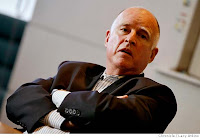Gun incident highlights residents' animosity toward the National Park Service
By KELLY DONOVAN & IAN MORRISON / Staff Writers
Victorville Daily Press
Last month, a local resident was arrested on suspicion of pointing a rifle at two National Park Service rangers in the Mojave National Preserve.
The incident underscores some of the tensions in the preserve, a place where residents steeped in the traditions of the Old West are grappling with the transition to a culture more similar to that of a national park.
According to the U.S. Attorney's Office in Los Angeles, Leo H. Spatziani and another man were approached by the rangers as the men allegedly operated a dredging machine on public land near an area rich in sensitive archeological and cultural resources.
Bobby Parker, the other man with Spatziani, said this week that he and Spatziani were on Parker's 160-acre homestead, working to install a water line, when the rangers came up and asked them to stop.
Parker said he isn't sure why Spatziani reacted the way he did, but he guessed that Spatziani is among the preserve residents who are fed up with the National Park Service after more than 10 years of the agency's presence there.
The Mojave National Preserve's chief ranger, Denny Ziemann, said he thinks residents like Parker — who contends that the Park Service has a vendetta against him — are the vocal minority. Most of the people in the preserve are able to co-exist with the park service peacefully, Ziemann said.
While some residents report having good relations with the park service, there are also some who have complaints.
The birth of a preserve
The Mojave National Preserve, which is east of Barstow, sandwiched between interstates 15 and 40, was born after President Bill Clinton signed the California Desert Protection Act in 1994.
Unlike most national parks, a national preserve allows uses like hunting, grazing and mining within its territory.
And within the Mojave National Preserve, private land holdings are interspersed with federal property. The preserve is sparsely populated with an estimated 200 or less residents who've gotten used to life in the wilderness — many of whom lived in the area for years before the preserve was created.
Some of those people opposed the creation of the preserve.
"It was unwelcome," said Gerald Freeman, who operates a hotel, RV park, store and restaurant in Nipton, on the northern boundary of the preserve. "For the most part the locals were hostile. But a lot of them were squatters on government land ... they were just sort of anti-establishment, like the militias in some of the other states."
Ranching and land ownership
Critics like Parker and Dennis Casebler, a historian who runs the Goffs Schoolhouse, use the harshest possible language to describe how the park service has dealt with the people who live in the 1.6-million-acre preserve. Casebler goes as far as likening the park service to the Gestapo.
Casebler started to take action and wrote a letter Feb. 24 to U.S. Rep. Jerry Lewis,R-Redlands, that contains a litany of complaints about the park service.
Among other things, Casebler and Parker accuse the Mojave National Preserve of trying to eradicate the ranching and mining industries there — a charge the agency denies.
Ziemann said he doesn't think the park service has ever rejected a mining application in the preserve. He also said the Park Service doesn't pressure ranchers to leave, although the retirement of all the grazing allotments in the preserve is part of its General Management Plan, a blueprint for its future.
"We're not going to force these ranchers out," he said. "Nobody will ever be forced to sell their land."
Three major ranching families sold their properties to the National Park Foundation in recent years and moved out of the area, retiring their grazing allotments. Because the government cannot directly acquire land, the foundation buys it and then donates it to the park service.
Rob Blair, who is a fourth-generation member of the last remaining large ranch in the preserve, said he knows the park service wants the Blair Ranch grazing allotments to be retired. However, he said the park service and the National Park Foundation haven't tried to force him, because any sales need to be with willing sellers.
However, Blair said he knows some people feel intimidated.
"People say, 'They're going to take our land if we don't sell to them,' " Blair said. "People are scared for their homes, some of them."
One longtime resident of the area, Mike Daughtery of Baker, blames the park service for driving out the ranchers with grazing regulations.
However, he also said the ranchers might not have had other opportunities to sell their holdings for cash had the National Park Service and National Park Foundation not been interested in the land.
"There's no simple answers to this stuff," Daughtery said.
The federal government can forcibly acquire land through eminent domain proceedings, arguing that it is in the public's best interest, but Ziemann said the Mojave National Preserve would not do that.
"The claim that we're harassing these people or running them out is not true," Ziemann said.
One recent land dispute that has sparked public interest and continues to infuriate Parker and Casebler is a dispute involving longtime preserve resident Connie Connelly, who Casebler calls "a genuine desert character."
Parker and Casebler said they are upset that the park service has forced Connelly to leave the simple home she's lived in for years in a remote part of the preserve.
Ziemann said that Connelly was living on park service property without a valid lease — essentially squatting. Also, he said the park service had to spend about $60,000 several years ago to clean up waste generated at the site.
To help Connelly, Ziemann said the park service offered to buy her a new home anywhere she wanted. In the end, she agreed to move to Wyoming, and is scheduled to move this month, he said.


